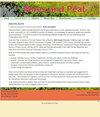Combining short-term manipulative experiments with long-term palaeoecological investigations at high resolution to assess the response of Sphagnum peatlands to drought, fire and warming
IF 1.5
4区 环境科学与生态学
Q4 ENVIRONMENTAL SCIENCES
引用次数: 30
Abstract
Northern hemisphere peatlands are substantial carbon stores. However, recent climate change and human impacts (e.g., drainage and atmospheric nutrient deposition) may trigger the emission of their stored carbon to the atmosphere. Biodiversity losses are also an important consequence of those changes. Therefore, there is a need to recognise these processes in space and time. Global change experiments are often conducted to improve our understanding of the potential responses of various ecosystems to global warming and drought. Most of the experiments carried out in peatlands are focused on carbon balance and nitrogen deposition. Nevertheless, it is still unclear how fast peatlands respond to temperature changes and water-table lowering in the continental climate setting. This is important because continental regions account for a significant proportion of all northern hemisphere peatlands. A combination of short-term and long-term approaches in a single research project is especially helpful because it facilitates the correct interpretation of experimental data. Here we describe the CLIMPEAT project - a manipulative field experiment in a Sphagnum-dominated peatland supported by a high-resolution multi-proxy palaeoecological study. The design of the field experiment (e.g., treatments), methodology and biogeographical setting are presented. We suggest it is beneficial to support field experiments with an investigation of past environmental changes in the studied ecosystem, as human impacts during the past 300 years have already caused substantial changes in ecosystem functioning which may condition the response in experimental studies.结合短期操作实验和长期高分辨率古生态调查,评价泥炭地对干旱、火灾和变暖的响应
北半球的泥炭地蕴藏着大量的碳。然而,最近的气候变化和人类影响(例如,排水和大气营养物沉积)可能引发其储存的碳向大气排放。生物多样性的丧失也是这些变化的一个重要后果。因此,有必要在空间和时间上认识这些过程。经常进行全球变化实验,以提高我们对各种生态系统对全球变暖和干旱的潜在反应的理解。在泥炭地进行的实验大多集中在碳平衡和氮沉积方面。然而,泥炭地对大陆气候环境下温度变化和地下水位下降的反应速度有多快还不清楚。这一点很重要,因为大陆区域占北半球所有泥炭地的很大比例。在一个研究项目中,短期和长期方法的结合特别有用,因为它有助于对实验数据的正确解释。在这里,我们描述了CLIMPEAT项目——一个在以泥炭为主的泥炭地进行的操纵性野外实验,该实验得到了高分辨率多代理古生态研究的支持。介绍了田间试验的设计(如处理)、方法和生物地理环境。我们建议通过调查研究生态系统中过去的环境变化来支持实地实验是有益的,因为过去300年的人类影响已经引起了生态系统功能的实质性变化,这些变化可能会影响实验研究中的响应。
本文章由计算机程序翻译,如有差异,请以英文原文为准。
求助全文
约1分钟内获得全文
求助全文
来源期刊

Mires and Peat
ENVIRONMENTAL SCIENCES-
CiteScore
2.30
自引率
16.70%
发文量
0
审稿时长
33 weeks
期刊介绍:
Mires and Peat is a peer-reviewed internet journal focusing specifically on mires, peatlands and peat. As a truly “free-to-users” publication (i.e. NO CHARGES to authors OR readers), it is immediately accessible to readers and potential authors worldwide. It is published jointly by the International Peatland Society (IPS) and the International Mire Conservation Group (IMCG).
Mires and Peat is indexed by Thomson Reuters Web of Science (2017 Impact Factors: 1.326 [two-year] and 1.638 [five-year]), Elsevier Scopus, EBSCO Environment Complete, CABI Abstracts, CSA Proquest (including their Aquatic Science and Fisheries Abstracts ASFA, Ecology, Entomology, Animal Behavior, Aqualine and Pollution databases) and Directory of Open Access Journals (DOAJ). Mires and Peat also participates in the CABI Full Text Repository, and subscribes to the Portico E-journal Preservation Service (LTPA).
Mires and Peat publishes high-quality research papers on all aspects of peatland science, technology and wise use, including:
ecology, hydrology, survey, inventory, classification, functions and values of mires and peatlands;
scientific, economic and human aspects of the management of peatlands for agriculture, forestry, nature conservation, environmental protection, peat extraction, industrial development and other purposes;
biological, physical and chemical characteristics of peat; and
climate change and peatlands.
Short communications and review articles on these and related topics will also be considered; and suggestions for special issues of the Journal based on the proceedings of conferences, seminars, symposia and workshops will be welcomed. The submission of material by authors and from countries whose work would otherwise be inaccessible to the international community is particularly encouraged.
 求助内容:
求助内容: 应助结果提醒方式:
应助结果提醒方式:


